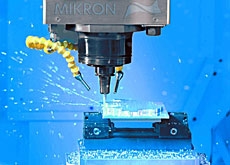machine industry drives exports

Switzerland's engineering and metal sector generates some of the country's largest exports, especially with the global economic upturn.
But according to Kurt Meier, deputy director of the industry’s lobby group Swissmem, success for Swiss-based companies is synonymous with ever-improving quality.
swissinfo: What does Swiss Made mean to you?
Kurt A. Meier: Trustworthiness, quality and precision are terms that have been used define the Swiss Made trademark.
swissinfo: The machine, metal and electronics sector is one of the most important for Swiss industry. How did that come about?
K.M.: It’s a success story that has lasted 150 years. We have managed over time to improve our products constantly and to use all possible synergies.
Thanks to our experience with the watch industry, we have been able
to produce small components efficiently.
Switzerland is a small country with no real natural resources. Our domestic market is small and that defines the behaviour of our industry.
We have to export. And to survive fierce competition, we have to make sure we are better than the others.
To be the best, we need research, development and proper training.
For years, we have considered training apprentices and maintaining contacts with the [country’s] universities important. Our sector also gives young engineers a great chance to start their careers.
swissinfo: With globalisation, new markets have appeared, but manufacturing is also moving offshore. Is Swiss Made still bound to Swiss-based production?
K.M.: Most of what we produce is made in Switzerland. But many Swiss firms now produce abroad as well. A survey of our members a few years ago showed that about 20 per cent of them had foreign production facilities.
Moving production offshore is nothing new. It has been happening for a couple of decades. Earlier, production was sent to Germany; today, it’s China or the Czech Republic. It’s either because of cost or to get closer to the customer.
We have noticed though that cost differences only play an important role when quality falters.
swissinfo: So high production costs are not really a problem in Switzerland?
K.M.: Most of our costs have nothing to do with raw materials or the use of machinery. It’s the salaries for engineers and other specialists that cost us more than anything else.
We have work within local constraints and produce high performance and quality products. Our customers consider quality the most important criteria, and they usually come from industrialised countries.
swissinfo: Looking to the future, what will be the biggest challenges facing your sector?
K.M.: We have very good bilateral accords with the European Union, that give us access to the European economic area. [But] we export 80 per cent of our production, so we would be interested in freer trade for our goods.
What we have to do is make sure we are always in front. That is the future for us. If we can stay innovative, we needn’t fear competition. But we have to rely on top quality and well-trained employees to build on our success.
swissinfo-interview: Marzio Pescia
Swissmem represents around 950 companies in the engineering, metal and electronics sector.
This industrial sector generates more exports than pharmaceutical and chemical companies.
Germany is the biggest foreign market, taking in about a quarter of Swiss exports in the sector.
In 2005, exports to India, Poland, the Netherlands, Hungary, the Czech Republic, the United States and China all grew substantially.
Exports from the engineering, metal and electronics sector were worth SFr61 billion in 2005.
This accounted for 40 per cent of all Swiss exports.
Around 300,000 people work in the sector in Switzerland.
Approximately one million were employed by Swiss companies around the world.

In compliance with the JTI standards
More: SWI swissinfo.ch certified by the Journalism Trust Initiative
You can find an overview of ongoing debates with our journalists here . Please join us!
If you want to start a conversation about a topic raised in this article or want to report factual errors, email us at english@swissinfo.ch.